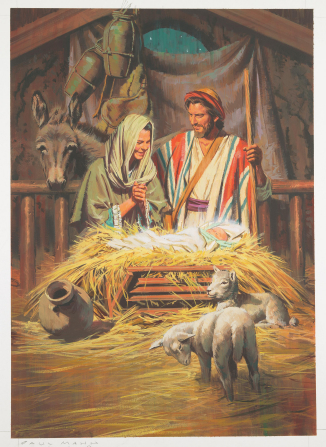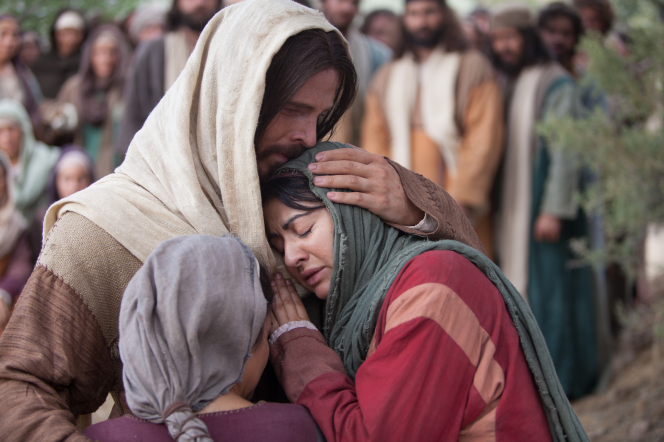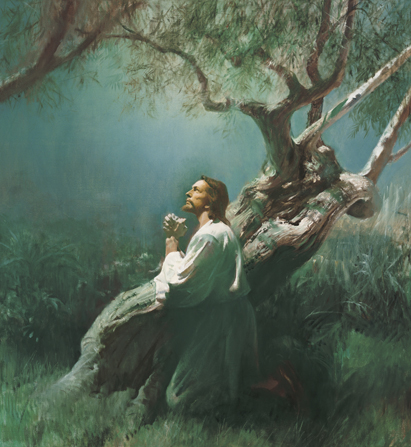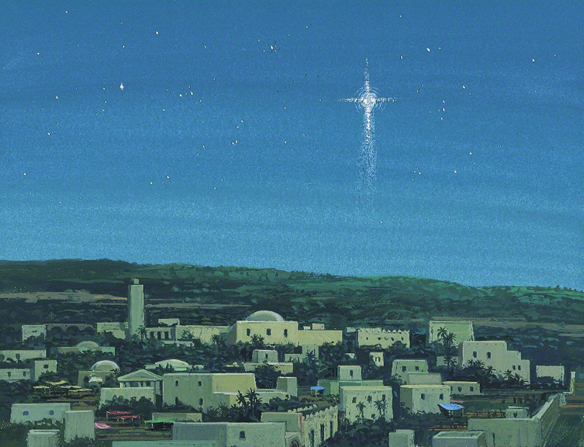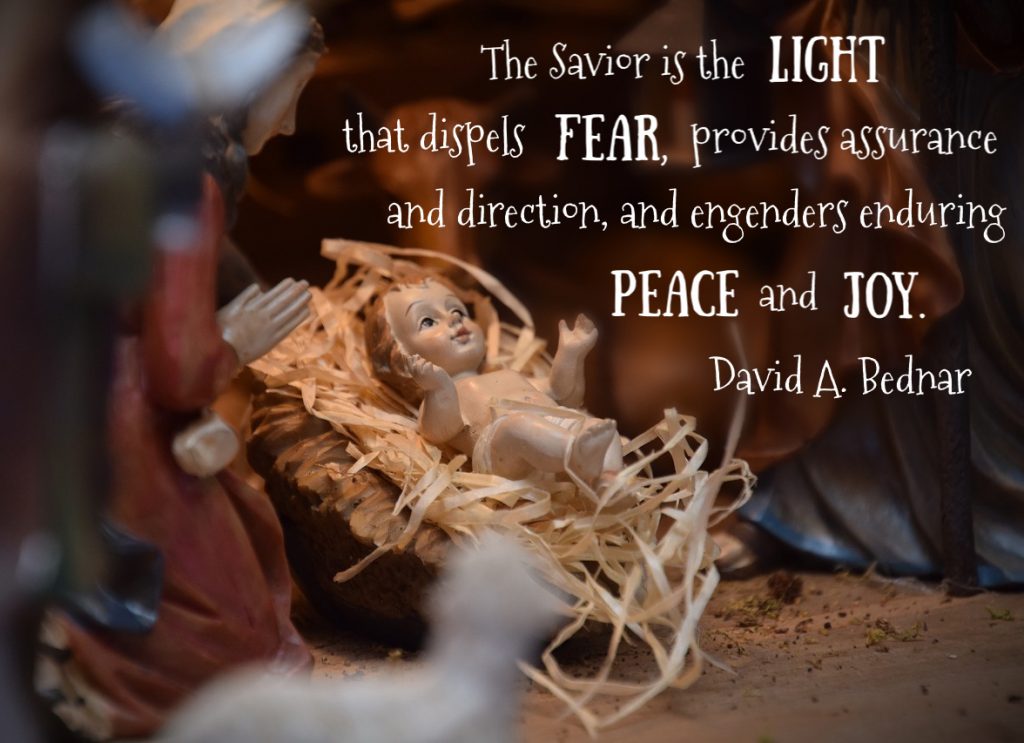Just days before Christmas, I read a short news story about a child in our small town who was hit and killed in a terrible auto-pedestrian accident. According to the report, it was a horrible instance of tragic timing, that happened so fast the driver did not have time to stop. Regardless of the full details, two families are grieving at a time of year that should be full of magic and joy. It brought back memories of a tragic event in my own family this same week more than three decades ago, when close relatives lost their baby to sudden-infant death syndrome in our home. I can still feel the grief and sadness of that day all these years later.
It is such awful timing—right before Christmas. The day we celebrate the birth of our Savior, Jesus Christ. But these events are also powerful reminders of why He came to earth. Elder Jeffrey R. Holland said,
To be true to the complete experience we must on occasion speak of Christmases—and other days in our individual and collective lives—that for whatever reason may not be as joyful or do not seem to be “the season to be jolly.” …
The true meaning, the unique, joyous meaning of the birth of this baby was not confined to those first hours in Bethlehem but would be realized in the life He would lead and in His death, in His triumphant atoning sacrifice … and in His prison-bursting Resurrection. These are the realities that make Christmas joyful.
These tragedies help us to focus on the real joys of Christmas—which are not the lights, presents, trees and trimmings, but are the gifts that Jesus Christ brought to us.
The Gift of His Mission and Ministry
The Savior’s birth was just the beginning of His mortal mission and ministry. All of the gifts that He gave to us came through His life, death and resurrection. President Russell M. Nelson explained,
His mission was the Atonement. That mission was uniquely His. Born of a mortal mother and an immortal Father, He was the only one who could voluntarily lay down His life and take it up again (see John 10:14–18). The glorious consequences of His Atonement were infinite and eternal. He took the sting out of death and made temporary the grief of the grave (see 1 Corinthians 15:54–55). … Not only was [the Atonement] to provide for the resurrection and immortality of all humankind, but it was also to enable us to be forgiven of our sins—upon conditions established by Him. Thus His Atonement opened the way by which we could be united with Him and with our families eternally. This prospect we esteem as eternal life—the greatest gift of God to man (see Doctrine & Covenants 14:7).
Jesus Christ was the only one who was qualified to make this atoning sacrifice to redeem mankind. President Nelson continued,
The Lord’s second far-reaching objective in mortality was to serve as an example for us. His exemplary life constituted His mortal ministry. It included His teachings, parables, and sermons. It encompassed His miracles, loving-kindness, and long-suffering toward the children of men (see 1 Nephi 19:9). It embraced His compassionate use of priesthood authority. It included His righteous indignation when He condemned sin (see Romans 8:3) and when He overthrew the tables of the money changers (see Matthew 21:12). It also included His heartaches.
It is because of and through His mission and ministry that we receive His gifts.
The Gift of Hope
Our Heavenly Father knew that we would experience good and bad, joy and tragedy during our earthly sojourn. So He sent Jesus Christ to earth to give us the hope of a better world, a brighter future and a better life. But His ways are not our ways, and His thoughts are not our thoughts (Isaiah 55:8). So sometimes this hope does not come in the way we expect. Elder Dieter F. Uchtdorf taught,
Hope … is like the beam of sunlight rising up and above the horizon of our present circumstances. It pierces the darkness with a brilliant dawn. It encourages and inspires us to place our trust in the loving care of an eternal Heavenly Father, who has prepared a way for those who seek for eternal truth in a world of relativism, confusion, and of fear. …
Hope is not knowledge, but rather the abiding trust that the Lord will fulfill His promise to us. It is confidence that if we live according to God’s laws and the words of His prophets now, we will receive desired blessings in the future. It is believing and expecting that our prayers will be answered. It is manifest in confidence, optimism, enthusiasm, and patient perseverance.
In the language of the gospel, this hope is sure, unwavering, and active. … It is a hope glorifying God through good works. With hope comes joy and happiness. With hope, we can “have patience, and bear … [our] afflictions.”
It is the hope that because Christ came, because He overcame the world, we can overcome the world—and all of its trials and tragedies. It is the hope of good things to come, if not in this life then in the next.
The Gift of Forgiveness
Somewhere in our small town are two grieving families—the family who lost the child and the family of the driver. I can’t imagine the heartache on both sides. This is a time for forgiveness. Forgiving doesn’t always mean assigning blame or admitting doing something wrong. Sometimes we must find forgiveness for the terrible situation. Let me explain.
One of my sisters put my infant relative down for his nap—the nap from which he did not wake up—when we were kids. It took her decades to forgive herself and find peace. What did she do wrong? What could or should she have done differently? Why did God allow this to happen? These questions haunted her. But she had done nothing wrong, and there was nothing she could or should have done differently. And all we know is that Heavenly Father had His reasons. I’m certain that similar feelings exist among the two families in my small town. That is just part of human nature. President James E. Faust taught,
All of us suffer some injuries from experiences that seem to have no rhyme or reason. We cannot understand or explain them. We may never know why some things happen in this life. The reason for some of our suffering is known only to the Lord. But because it happens, it must be endured. …
If we can find forgiveness in our hearts for those who have caused us hurt and injury, we will rise to a higher level of self-esteem and well-being. Some recent studies show that people who are taught to forgive become “less angry, more hopeful, less depressed, less anxious and less stressed,” which leads to greater physical well-being. Another of these studies concludes “that forgiveness … is a liberating gift [that] people can give to themselves.”
Finding Forgiveness
It’s easy to talk about forgiving others, but it’s often harder to put into practice. Especially during times of grief and pain. Forgiveness is found in the company of faith. President Faust taught,
Forgiveness comes more readily when … we have faith in God and trust in His word. Such faith “enables people to withstand the worst of humanity. It also enables people to look beyond themselves. More importantly, it enables them to forgive.”
More than a decade ago, a gunman walked into an Amish schoolhouse and shot 10 girls, killing 5 of them, before killing himself. It was a senseless tragedy. But the Amish people reached out to the gunman’s widow and offered her and her family their forgiveness and love. President Faust said,
What can we all learn from such experiences as these? We need to recognize and acknowledge angry feelings. It will take humility to do this, but if we will get on our knees and ask Heavenly Father for a feeling of forgiveness, He will help us. The Lord requires us “to forgive all men” for our own good because “hatred retards spiritual growth.” Only as we rid ourselves of hatred and bitterness can the Lord put comfort into our hearts, just as He did for the Amish community.
It is a gift that we can extend to others at this Christmas season. Recently, I saw a person by whom I feel wronged. I bristled at the sight and realized that I still had animosity toward this person, and I need to forgive. President Faust continued,
Most of us need time to work through pain and loss. We can find all manner of reasons for postponing forgiveness. … Yet such a delay causes us to forfeit the peace and happiness that could be ours.
The Gift of Repentance
Along with the gift of forgiveness is the gift of repentance. While these may not seem like Christmas topics, they are among the reasons that Jesus Christ came to earth. He performed the Atonement, in part, to give us the ability to forgive others and be healed as well as to repent of the wrongs we have committed. As “no unclean thing can inherit the kingdom of heaven” (Alma 11:37), we would have no chance to return to live in the presence of our Heavenly Father without this gift. President Nelson explained,
This gift is not always well understood. As you know, the New Testament was originally written in the Greek language. In passages where the Savior calls upon people to repent, the word translated as “repent” is the Greek term metanoeo. This is a very powerful Greek verb. The prefix meta means “change.” We also use that prefix in English. For example, the word metamorphosis means “change in form or shape.” The suffix noeo relates to a Greek word that means “mind.” It also relates to other Greek words that mean “knowledge,” “spirit,” and “breath.”
Can we begin to see the breadth and depth of what the Lord is giving to us when He offers us the gift to repent? He invites us to change our minds, our knowledge, our spirit, even our breathing. For example, when we repent, we breathe with gratitude to God, who lends us breath from day to day. And we desire to use that breath in serving Him and His children. Repentance is a resplendent gift. It is a process never to be feared. It is a gift for us to receive with joy and to use—even embrace—day after day as we seek to become more like our Savior.
The Gift of Light
Jesus Christ also brought us the gift of light. From the star of Bethlehem to the bulbs on the tree, lights are a part of Christmas. Elder David A. Bednar taught,
Many of our memorable and enduring Christmas traditions include different kinds of lights—lights on trees, lights in and on our homes, candles on our tables. Indeed, light has significant meaning as we commemorate the humble birth of the Lord Jesus Christ. …
In the Old World, Jesus taught, “I am the light of the world.” And in the New World, the Savior descended from the heavens and declared, “I am the light and the life of the world.” In both of these settings, the words used by the Lord to describe Himself were “the light.”
Christmas lights bring so much sparkle and joy to the world at Christmas. But in times of tragedy, they light the way to peace. Elder Bednar continued,
… Jesus Christ is the “light which shineth in darkness.” In every season of our lives, in all of the circumstances we may encounter, and in each challenge we may face, the Savior is the light that dispels fear, provides assurance and direction, and engenders enduring peace and joy. May the beautiful lights of every Christmas season remind us of Him who is the source of all light.
The Gift of Peace
Above all, Jesus Christ brought to us the gift of peace. The Savior taught,
Peace I leave with you, my peace I give unto you: not as the world giveth, give I unto you. Let not your heart be troubled, neither let it be afraid (John 14:27).
This doesn’t mean that we won’t have trials or tragedies. President Nelson said,
He can bring peace to those whose lives have been ravaged by war. Families disrupted by military duty bear memories of war, which in my mind were imbedded during the Korean War. …
Peace can come to those who are not feeling well. Some bodies are wounded. Others ache spiritually because of missing loved ones or other emotional trauma. … Peace can come to your soul as you build faith in the Prince of Peace. … Peace can come to one who suffers in sorrow. Peace can come to those whose labors are heavy. …
Peace can come to those who mourn. The Lord said, “Blessed are they that mourn: for they shall be comforted.” As we endure the passing of a loved one, we can be filled with the peace of the Lord through the whisperings of the Spirit.
… Peace can come to all who earnestly seek the Prince of Peace.
Elder L. Whitney Clayton said,
The sweetest gift given at Christmas will always be the one our Savior Himself gave us: His perfect peace. …
Even in a world where peace seems far off, the Savior’s gift of peace can live in our hearts regardless of our circumstances. If we accept the Savior’s invitation to follow Him, lasting fear is forever banished. Our future has been secured. These are the “good tidings of great joy, which shall be to all people.”
The Gift of Love and the Spirit of Christmas
The Savior’s gift of love to us is one that we can share with others at Christmastime. We find the real joy of the season as we make the Savior the focus of it. President Thomas S. Monson said,
Born in a stable, cradled in a manger, He came forth from heaven to live on earth as mortal man and to establish the kingdom of God. His glorious gospel reshaped the thinking of the world. He lived for us, and He died for us. …
Our celebration of Christmas should be a reflection of the love and selflessness taught by the Savior. Giving, not getting, brings to full bloom the Christmas spirit. We feel more kindly one to another. We reach out in love to help those less fortunate. Our hearts are softened. Enemies are forgiven, friends remembered, and God obeyed. The spirit of Christmas illuminates the picture window of the soul, and we look out upon the world’s busy life and become more interested in people than in things. To catch the real meaning of the spirit of Christmas, we need only drop the last syllable, and it becomes the Spirit of Christ.
Unfortunately, life doesn’t stop because it’s Christmas. Tragedies don’t always wait until after the new year is over. But often, that is where we find the deeper meaning of Christmas. When, as Elder Holland said, we celebrate “not in the absence of hard days and long years…, but because of them.” Because we understand that the true joy of Christmas comes in the hope that the Christ child brought to the world.

